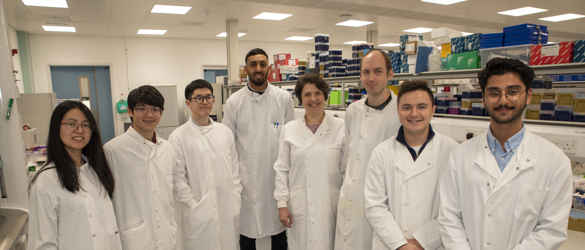
Current treatments for macular disease
As you may know, or have heard from your eye doctor, there are some treatments available for some types of macular disease. For example, treatments for wet age-related macular degeneration (wet AMD). However, there are still many types of macular disease where there are no pharmaceutical treatments available. We are dedicated to funding research to find new treatments to beat macular disease.
Wet AMD and Anti-VEGFs
The current treatments for wet AMD are drugs called anti-vascular endothelial growth factors (anti-VEGFs). Wet AMD is caused by increased growth of blood vessels in the back of the eye, with the blood vessels leaking fluid. The growth of blood vessels and the leakage they produce damage the cells of the retina, causing the light sensing (photoreceptor) cell death, and therefore vision loss. Anti-VEGF drugs work by stopping the growth of new blood vessels in the macula and reducing the leakage.
Those with wet AMD can usually get anti-VEGF treatment on the NHS. The NHS have approved two drugs, called Eylea (aflibercept) and Lucentis (ranibizumab) for use for wet AMD; these are administered as an injection into the eye. Most patients require these injections around every 4-8 weeks.
Research is looking at new drugs, which need less frequent injections. We hope these will be available soon, to reduce the burden of frequent injections on both patients and eye clinics.
Beovu (brolucizumab) is a new type of anti-VEGF that can be injected every 8-12 weeks to maintain vision. It has been approved by the Scottish Medicine Consortium (SMC) and National Institute for Health and Care Excellence (NICE), who decide which drugs are available on the NHS.
The future of macular disease treatment
The Macular Society is dedicated to finding new treatments for all of those who have macular disease. We do this by funding early stage and clinical research into macular diseases. We also work with pharmaceutical companies providing insight into our members’ wants and needs.
Currently for diseases such as dry AMD, Stargardt disease, and more, there are no treatments available. Many patients are told when they are diagnosed that there is little to nothing to be done to stop the vision loss. This can be disheartening and distressing for patients.
However, there are many very promising clinical and research studies looking into new treatments for the different types of macular disease. These include studies into wet and dry AMD, Stargardt disease, myopic macular degeneration and more.
More on treatments
Read more about treatments available for patients with macular conditions, including wet AMD. Get expert insights from the Macular Society on the latest research into treatments.
Where research is now
Information about new treatments such as stem cell and gene therapy, and how they can help people with macular disease.
Our research projects
Since 1987 the Macular Society has invested around £10 million in over 100 research projects.
Get involved in research
Patients have a very important part to play in medical research. Without them we would not have the treatments we have today and new and improved treatments would not be possible.
Get the latest research news from the Macular Society
To hear about life-changing research and treatments, subscribe to our monthly enewsletter today. Together we can Beat Macular Disease.
Sign up to our free email newsletter





